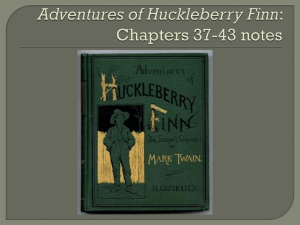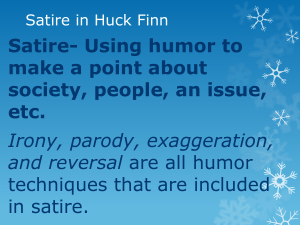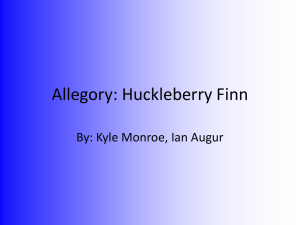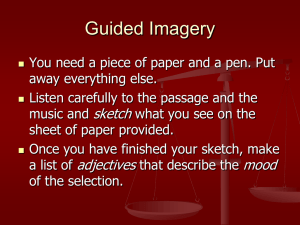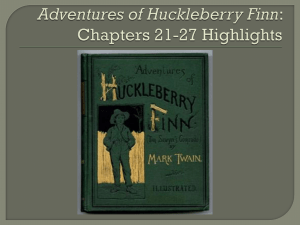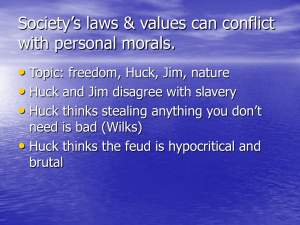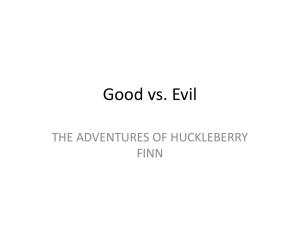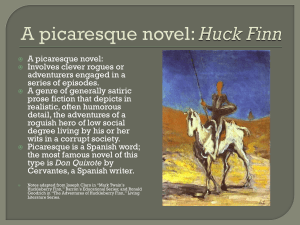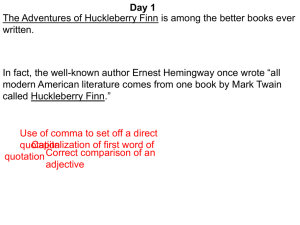File
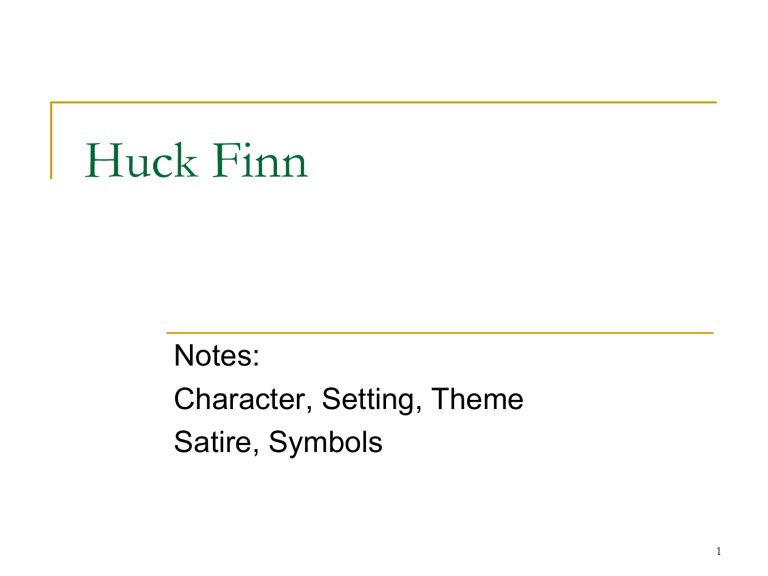
Huck Finn
Notes:
Character, Setting, Theme
Satire, Symbols
1
Satire
Literary
Religious
Societal
2
Literary Satire
Tom ’ s imaginary adventures
He insists on doing all things according to the books he has read
Have his gang sign in blood their oath of allegiance
Capture and hold people for ransom even though Tom doesn ’ t know what it means: “ I don ’ t know…I ’ ve seen it in books…that ’ s what we ’ ve got to do ” .
3
Religious Satire –
Twain denounces organized religion with several references
Huck prays for fish hooks
because Miss Watson told him whatever he prayed for he would get
The Widow Douglas
tells Huck about the “ good place ” and teaches him about the bible but later on they “ fetched the niggers in and had prayers… ”
The raid on the Sunday school picnic
Tom said it was Arabs and Spanish merchants while Huck says to himself afterwards that it was only a “ primer class ”
Hypocrisy of the Gangerfords and Shepherdsons
the sermon is on brotherly love; they bring their guns to church and prop them against the wall
4
Societal Satire
Twain criticizes a society which forces a son to obey such a corrupt and evil person as Pap
Satirizes American values; society is more interested in a dead body ( Huck ) than it is in the welfare of living people ( Huck )
Huck ’ s conscience tells him that Jim is corrupt to think of stealing his own children from another man
Feuds are satirized: Buck wants to kill a man, not because he carries any hostility towards him,, but because his family is feuding with the other ’ s family
He exposes slavery and shows blacks to have feelings just like others, especially in the episode where Jim tells Huck about his daughter
Twain shows an aversion to royalty with the adventures of the
Duke and the King
5
Literary Satire
Emmeline Grangerford ’ s sentimental poetry for dead people
If Emmeline Grangerford could make poetry like that before she was fourteen, there ain ’ t no telling what she could ‘ a done by and by ” .
The wreck the Walter Scott – sentimental
British writer; Twain names the wreck after the writer
6
Setting –
contrast of the river and shore
The river
Where Huck and Jim feel safest
“ We said there warn ’ t no home like a raft, after all.
”
“ You feel mighty free and easy and comfortable on a raft.
”
Where Huck and Jim develop a friendship
They can think for themselves
No authority
Huck is brave enough to break with what others assume is correct and just.
7
Setting – on shore
Shore is oppressive compared to the freedom of the river
Where Huck sees the hypocrisy of society
Huck and Jim
encounter slavery, deception and another side of civilization on shore
See social injustices
The trickery and cheating of the King and Duke
The lack of caring by the townspeople for Boggs
The innocence of the Wilks sisters
8
Huck ’ s Character:
shrewd, gullible and
compassionate
An uneducated backward boy
Constantly under pressure to conform to society
Has racist attitudes at first
Tries to find freedom
He learns to think and reason for himself
Develops empathy for Jim – decides not to turn him in and with
Jim ’ s fate in his hands, he decides to “ give up try ’ in ” ( smallpox incident )
But follows Tom Sawyer when he reappears – he is easily molded and his morals and empathy fail him
The only time his morality and loyalty to Jim are clear is when he makes decisions alone with only his heart guiding him
9
Huck’s Developing Character
Initial Character
Follows Tom
Looks down on Jim
Believes society more important than human feelings
Goes along with King and Duke
Loses his identity
10
Huck’s Developing Character
Forces of Change
Sees Tom ’s unrealistic nature
Grows to know and care for Jim
Observes the bloody feud
Unable to betray Jim
Travels down the river with Jim
11
Huck’s Developing Character
Character Change
Follows his own ideas
Respects Jim
Realizes the stupid savagery inside
Believes human feelings more important than society
Sympathizes with all humanity
Gains a new sense of self
12
Theme
Growing up and maturing
Huck takes care of himself
Although young, he faces many adult situations
i.e an abusive father, Jim ’ s freedom; confessing to the Wilks
The feud between the Grangerfords and Sheperdsons is one of the most tragic things in the book; he sees blood and dying that nauseated him
The cowardice of the mob that goes after Colonel Sheburn and how they only gain courage borrowed from their mass
He feels bad for the King and Duke when they are tarred and feathered by the townspeople. His ill feelings toward them melt away: “ Human beings can be awful cruel to one another ” , he observes. He concludes that a conscience is useless because it makes you feel bad no matter what you do.
13
Theme
Learning to think and reason morally for oneself
Huck develops a moral conscience
He apologizes to Jim for fooling him about the dream
Huck struggles with obeying the law and turning Jim in or risk having a bad reputation and protect Jim
He fears he may have done wrong in helping a slave to escape. His traditions and environment pull him one way; what he feels in his heart pulls him another way.
He feels better after he writes the letter to Miss Watson but tears it up and says, “ All right, then, I ’ ll go to hell ” .
His idea of racism is based on his upbringing but he questions the validity of black inferiority
Huck admits that Jim “ had an uncommon head for a nigger ” .
14
Theme
The quest for freedom
Jim seeks freedom from slavery – he runs away when he hears Miss Watson talking of selling him
“ down the river ”
Jim can ’ t do anything against the rules of his taboos, superstitions and charms
The hairball, the snake-skin
Huck seeks to be free and not have to live in fear of his father, or being civilized
15
Symbols in the Novel
The River
Freedom for Huck and Jim
Jim
Symbolizes all the slaves in the south; we see the southern attitudes toward black people; we also see through Jim the humanity even in slaves
Widow Douglas and Miss Watson
Symbolize society and civilization; they tried to civilize Huck but he ran away from them
The Raft
Grangerfords and Shepherdsons
The King and Duke
16
